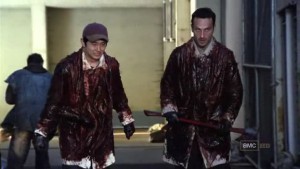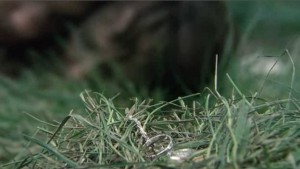The Walking Dead – “Guts”
“You’re surrounded by walkers. That’s the bad news.”
“There’s good news?”
“No.”
Well, it was about time for Atlanta’s representative racist hick to come out and play small-time antagonist. I suppose we could do worse that Michael “The Rook” Rooker to portray him but I would’ve preferred him to not be there at all what with all the over-pronounced drawls everywhere else. But there he was, dropping the “N” word just so we could all be educated about how old divisions blurred when they had a new enemy to hate. Instead of pouring your generations-descended loathing onto classes and race, funnel your hatred into killing ghouls instead.
Last week, I described how a horror series could do things a horror movie could not, specifically build deeper emotional connections and construct stronger characters. Unfortunately, this is not an episode that does very much of that at all. In fact, it sounded and functioned more like the end of the first act of a B zombie flick. Where the pilot felt more like an AMC show (subtle as a show of this bent could be while never talking down to the viewer), the follow-up is very specific and very obvious. I’d say it’s forgivable, however, as long as this was just a way to get the new group out of the city and into some deeper plot. Otherwise, we’re looking at some serious disappointment.
With the opening involving two of the characters having sex (even if they are, for all intents and purposes, “safe”), it made me consider the horror rules we know so well, if not from a history of watching the genre then at least from the movie Scream. Having sex is a big no-no in horror movies (as are doing drugs and drinking) as an extension of some morality code for genre: killing bad people is gruesome and frightening but tenable. And while Shane and Lori don’t die in this episode (although the shot of him turning her onto her stomach with the locket in the foreground probably walks a fine line in that convention), the episode does follow some other horror tropes, specifically (and sadly) leaning on archetypes in order to quickly establish two-dimensional characters and to float one of the show’s philosophies.
They don’t give a lot of time to develop the group Rick runs into in downtown Atlanta because this episode has a purpose. They are trying to get everyone out into the world, presumably to meet up with the other survivors. So, instead of building on the mood from the pilot, this episode is constructed more like what we’re used to for this genre: lots of action and characters that have little depth. In fact, we can separate the downtown contingent into two groups: those with familiar personalities that may be important later and those with no depth who probably end up dying. In the former category we have Dixon (Rooker’s hick who will haunt them later), Glenn (the guy that saved Rick from the tank and Rick’s most trusted ally), and Andrea (the woman-of-interest). The others are Jacqui (little more than a reason to explain why an open sewer entrance was in the building), T-Dog (sadly a shallow representation of minorities for Dixon to pummel), and Morales (who has been a lackey thus far). To say the former group has more definition, though, is a bit misleading since those three don’t really have much depth either. Dixon is a racist hick in a Mel Gibson vein (he even calls Andrea “sugar tits” at some point) that can’t be trusted since he’s clearly a think-for-himselfer. Glenn is nervous but semi-confident since he knows the area well. And Andrea fits into the nice, tough girl box that allows her to be “strong” while still making herself appealing to Rick (even if he’s not ready for that yet). All of the characters are hampered by weak dialogue that belongs more in a production of The Asylum than in an AMC-produced show.
The unfortunate thing about these elements in that is brings down the drama inherent in what they have to accomplish for this episode. Dixon represents all the ills of society before the outbreak; his position is negative along race and gender lines. After he beats into T-Dog, Rick cuffs him to a pole and explains one of the philosophies of the show: we are united against a common enemy. He never tells Dixon that he’s wrong for thinking the things he does but, essentially, that it’s counterproductive. Locking him up isn’t punishment for his racial slurs and hate crimes but only as a way to not break the unity and direction of the group. He’s isolated from society for light treason not for his opinions.
Because hate is valuable in this post-outbreak world. It is only that us vs them mentality, demonizing the walkers, that they can do what they have to in order to survive. To recognize the walkers as tortured souls desperate for help might endear the diseased zombies to them. Instead, they take the position that the ghouls will kill and infect them given the chance so they are okay to kill.
This, of course, is a turnaround from how Morgan and his son deal with the walkers. They also employ a kill-them-first mentality, except when dealing with the mother, on whom Morgan can’t pull the trigger. Rick even goes back to the park where he met a legless zombie and shot her in an act of euthanasia. There’s a brief period where they have a “his-name-is-Robert-Paulson” moment for the zombie the group chops up to smear his guts in order to smell like the ghouls. But it wasn’t the same as the pilot. The pilot demonstrated this struggle of the abject, where the survivors saw themselves in the undead and were forced to reconcile the idea that these monsters were human, that something as frightening as death walks among them, stupid, bestial, devoid of intellectual thought. Here, they recognize that the zombie-in-pieces once had a name but Rick takes it too far by saying he’s going to tell his family about him. We know Rick won’t be able to do that (if he even has a family to return to thanks to Shane) and it seems almost more like a move for the group’s benefit (though the organ donar line was funny) and not from any sincere place of mourning for the lost soul.
Now that this action sequence laden episode is out of the way, perhaps episode 3 can return to its development-oriented self and explore deeper storylines, build emotional connections, demonstrate some depth for the characters.
- This clearly isn’t the first time Shane and Lori have had sex. Has he never seen the locket? I mean, I know he likes to quickly switch from missionary to “congress of the cow” but surely he’s seen her naked neck before.
- The time bomb for the episode is well set-up (the thunderstorm that would eventually wash the smell from Rick and Glenn) though it’s curious that no one heard the thunder and thought that maybe rain was coming.
- T-Dog may represent minorities Dixon hates but, apparently, Glenn represents Tokyo drifting stereotypes.
- Atlanta has no department stores downtown. The last one was Macy’s and, interesting enough, they closed it down due to lack of interest from the community years ago despite the city’s desperate attempts to get people to move downtown. In the space where Macy’s used to be, they are now building a larger shopping and dining area.
- I kind of wish they’d paid more attention to the public transportation. The train and bus system in Atlanta is called the Metropolitan Atlanta Rapid Transit Authority (MARTA). The bus Glenn and Rick climb from under after being soiled by guts is a Metro Local, Los Angeles’s public transportation service.
- November 8, 2010
- Nick
- Episode Review
- The Walking Dead



